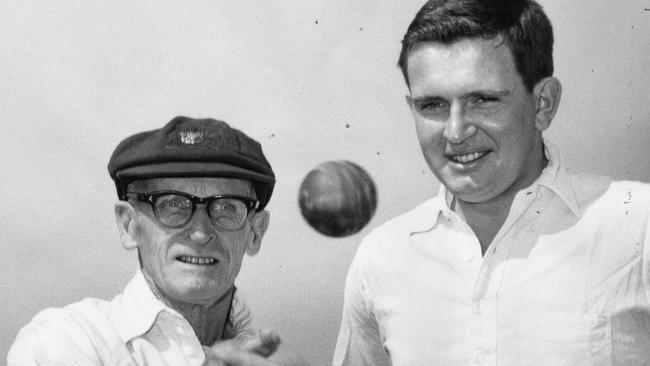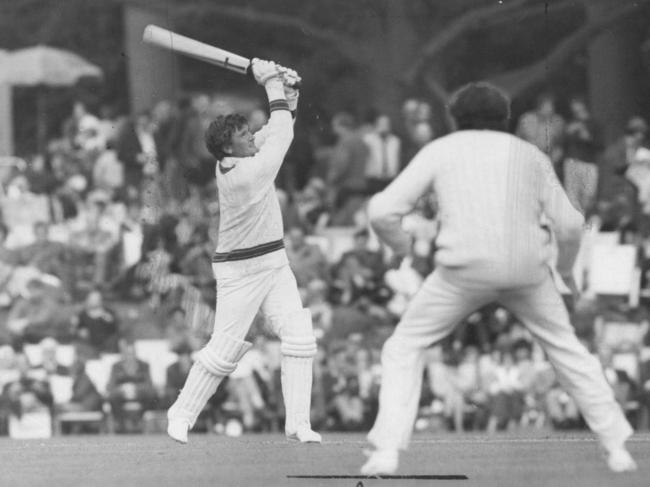‘You always felt under pressure playing against him’: Stackpole could be a wrecking ball
Keith Stackpole was a driven man – and the faster the bowling, the more driven he became. In an age of circumspection, he was on the front foot.

Keith Stackpole’s cheeky nature and solid frame disguised one of cricket’s hard men.
Cutting a pose that suggested Stackpole enjoyed his time at the bar as much as he did on the field during television’s black and white days, the Australian opening batsman and vice-captain could be mistaken for being a comfortable cricketer.
But he was a driven man, and the faster the bowling the more driven he became, lashing anything short in an age where batsmen often put circumspection first.
Stackpole, MBE, died on Tuesday, aged 84.
“His courage and competitive nature stand out,” Greg Chappell told The Australian on Tuesday, recalling Australia’s 1973 tour of the West Indies. “Jamaica were set to unleash their next-generation fast bowler Uton Dowe in a tour match but decided not to play him.
“Ten of us were relieved and Stacky was angry as only Stacky could be. He wanted to take him on.
“Dowe played in the Test that followed and Stacky really took to him. Dowe fancied he could get Stacky caught on the hook and the shorter he bowled, the further the ball went.
“When captain Rohan Kanhai went to bring him back with the second new ball, someone amongst the packed crowd yelled: ‘Hey Kanhai you forgot the 11th Commandment, Dowe shall not bowl’.”
It would not be unfair to suggest Stackpole ended Dowe’s short Test career.

In the search to replace the great Richie Benaud, Stackpole floated into the Australian team as a leg-spinner who batted in a career that began in much the same way as Steve Smith’s in the post-Shane Warne era.
Stackpole’s promotion to open the batting by Test captain and Victorian teammate Bill Lawry three years after his 1966 Test debut unleashed a side of Stackpole’s game that surprised many, including him.
Stackpole went on to open in 64 of his 80 innings across 43 Tests, averaging 40.51, with six of his seven centuries. It compared favourably with his overall average of 37.43, but it was the way he got those runs that people remember.
In era that had corpses with pads in opposing teams – namely Lawry and Geoff Boycott – Stackpole could be a wrecking ball.
Revered old-school cricket writer Christopher Martin-Jenkins wrote: “Keith Stackpole was a lusty right-handed opening batsman who almost always attacked, and often hooked and cut so hard at the new ball that his occasional edges were just too hot for fielders to hold.”
It was Stackpole who informed room-mate Lawry during a Sheffield Shield match in Adelaide that he had been sacked as Australian captain. In the days when team announcements were simply released to local wire service Australian Association Press without explanation, South Australian cricketer-turned-cricket-writer Alan Shiell from the now-defunct Adelaide News rang Lawry’s room and Stackpole took the call.
“I think I’d better tell him,” Shiell recalled Stackpole saying, before Shiell rang his former state captain Ian Chappell to tell him he had the top job.
Chappell famously said “the bastards (Australian Cricket Board) won’t get me the way they got Bill” and Stackpole made the same resolution, retiring after a disappointing tour of New Zealand in 1974 at the age of 33.

But Stackpole played on in Melbourne District Cricket, now Premier Cricket, as a dominant force, enhancing his fearsome reputation as a competitor.
As a rising teenage star batting at No.3 for Carlton, the late Dean Jones related arriving at the crease second ball after Stackpole had turned the opening delivery straight to square leg, running his partner out by metres.
“Jeez what was a bit hot Stacky,” Jones said after arriving at the crease.
“This pitch is too good to waste on him,” Stackpole replied.
A young Jonathan Agnew, who later played three Tests for England and has spent a lifetime commentating on the BBC, arrived in Melbourne to play District cricket.
He was taken aback to find that far from him sledging as a fast bowler, he copped it from Stackpole opening the batting.
“It certainly wound me up,” Agnew recalled years later. “The faster I bowled, the further he hit me. It was a great education.”
Promising all-rounder Tony Dodemaide ran into Stackpole as a 17-year-old and he too received an instant education. “He was known to play the game as hard as he possibly could. I certainly have vivid memories of those first couple of games for Footscray against Carlton,” recalled Dodemaide, a current national selector who went on to play for Australia.
“You always felt under pressure playing against him. I’d never experienced anything like it.”
Born during World War II in working-class Collingwood surrounded by factories, life was a competition from its earliest days.
“Coming through that area, I realised early that if you don’t compete in this world you don’t get anywhere,” Stackpole said.
He grew up in the shadow of a father who was quintessentially Collingwood, first as a premiership VFL player then Victorian batsman who was a dominant club captain of the cricketing Magpies. “He was very old school,” Greg Chappell said of Stackpole. “He came up in a tough school under his dad.”
But most people saw and heard the genial nature of Stackpole beyond the boundary as a television and then radio commentator in the Channel 9 era.

Stackpole’s competitive nature combined with his loyalty made him deeply popular with teammates. Ian Chappell certainly appreciated Stackpole’s loyalty as his vice-captain.
“He was a very good vice-captain and was happy to be vice-captain,” Greg Chappell said. “He wasn’t one who harboured thoughts of getting the captaincy himself. He knew Ian was the right man.”
That loyalty extended long after his playing days, when Stackpole refused a life membership from the Victorian Cricket Association.
Asked by newly appointed Victorian coach Ian Redpath in the mid-80s to be the squad’s batting consultant, Stackpole walked away when his great Victorian and Australian teammate did not have his contract renewed.
“I’d have felt a hypocrite if I accepted it,” Stackpole told administrators at the time.
He would also keep an eye out for the younger players in the team, telling leg-spinner Kerry O’Keefe that he’d be better off attending the movies with Stackpole and Redpath rather than being stuck at the bar. “I’lI always remember his strong support for me as a teammate,” O’Keefe said.





To join the conversation, please log in. Don't have an account? Register
Join the conversation, you are commenting as Logout